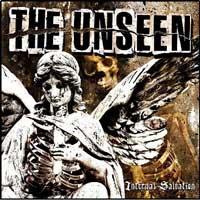Operating within the rigid stylistic boundaries of hardcore street punk has to be one of the biggest challenges to longevity for a band like the Unseen. To rehash old sounds, or try something new? That's always the question. If the band incorporates more melody and hooks, they can be accused of sounding too poppy. If they go for an aggressive, a-melodic, "just crank it" approach, they can be seen as boring. And of course, with stubborn punk fans resistant to change, any experimentation must be kept to a constant minimum. For these reasons, if none other, the Unseen deserve credit for managing to delicately evolve and remain relevant while staying rooted in the hardcore street punk they began delivering 14 years ago.
Most music of such a style, including the Unseen's back catalog, is direct and unambiguous from the first listen. No subtleties or surprises, you almost always get exactly what you're hearing. Internal Salvation is unique in that aspect. Even to a veteran street punk listener's ears, a first listen won't capture all of what this album has to offer, and if this review had been hurried for a July 10th release date spot, it may have been cast off as just another hardcore street punk album. Unexpectedly, Internal Salvation is a grower.
Like the title suggests, Internal Salvation offers a far more cogitative and even personal conveyance than the Unseen has dealt in the past. If the band's previous offering State of Discontent was the blunt reaction to a nation at war and a society at war with itself, Internal Salvation is the search for answers. Not content with brash sloganeering like the band's 1996 fan favorite "Goodbye America," Internal Salvation shows singer Mark Unseen's willingness to confront society's ills at odds with himself, for example, the opening song "Such Tragedy": "I share none of that pride / That part of me has long since died / A generation on the brink of destruction / A world saturated in corruption / You think this is the American dream? / You must be so sound asleep."
On the melodic hardcore / skatepunk of "Let It Go," M. Unseen wraps a reflective context around the struggles of today: "These problems aren't our doing / But we inherit them at birth / This suffering's not our legacy / But a chance to prove our worth / So we fight against oppression / And we pledge to do our part / Revolutions not born of bullets / But from a fire in our hearts." The transition from angry rallying cries to a more narrative songwriting approach hasn't been entirely smooth, as the fumbly attempt at poetic verses in "Torn and Shattered (Nothing Left)" indubitably testifies, "Torn away was all that mattered / And all of your hopes and dreams are now shattered / Smashed and scattered like glass into pieces / And now you walk alone / And glass can easily slice right down to bone."
Internal Salvation doesn't thrive from the warm, guitar-driven melodies like "We Are All That We Have" and "You Can Never Go Home" from State of Discontent, but a subltle introduction to new rhythms, riffs, and compositional formulas keeps the songs from bleeding into one another. Towards the end, songs like "Act the Part" and a cover of "Talking Bombs" by early Boston hardcore band the Freeze bring more melody to the mix, but the slow brooding intro to "In Your Place," the thrash-inspired "Step Inside Your Life," and the rolling, skatepunk-influenced drum pounds of "Let It Go" are what make Internal Salvation interesting. In a genre nearly paralyzed from progress and finding difficulty staying relevant, the Unseen have managed to do both without betraying themselves, their fans, or their roots.
